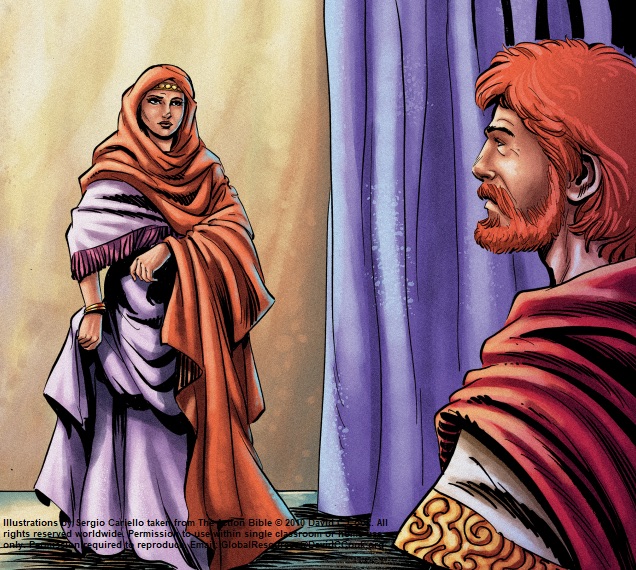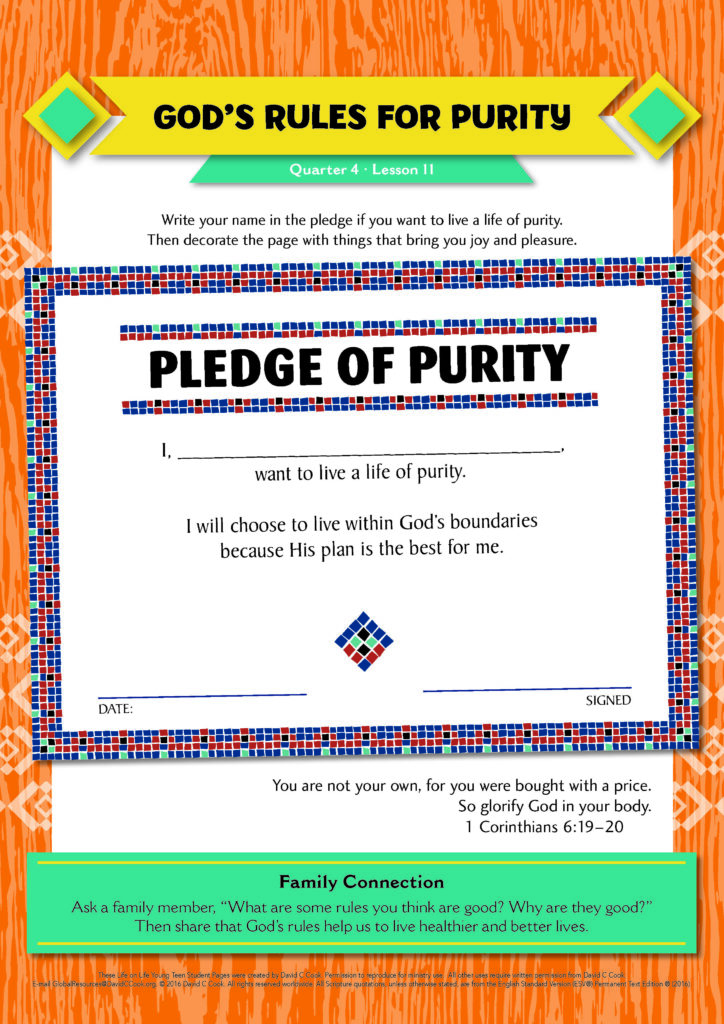During the lesson, the information for you to know is written in regular type, and what we suggest speaking or reading aloud to children is in bold. All resources for this lesson, including the Teacher Guide, Student Page, Family Connection Card, and other resources can be downloaded in a ZIP file by clicking on the following link:
In some lessons you will find "resource articles." These are articles written by experts from around the world to help equip you for your work with children and adolescents. Share them with parents or guardians if you consider it appropriate.
All a person’s ways seem pure to them, but motives are weighed by the Lord.
Proverbs 16:2
Do you ever find yourself comparing your faults to those of others? It is easy to make ourselves feel better about our own faults by believing that others’ faults are worse than ours. We think, “Surely our sins are small compared to the wrongdoings of others.”
However, it is not our own judgment that matters. It is God’s. He calls us to fix our eyes on His standards, not on the standards of the world or the choices of others. Consider a time when you compared yourself to others and felt that you were doing well. Now compare that same choice to God’s standard. Are you reaching for His best for your life? When He looks at your motives in this area, will He see a faithful believer who is seeking His will or a person weighed down by worldly choices? Spend a few moments giving your choices to God. Allow Him to “weigh your motives,” and invite Him to lift off any burdens of sin that hold you down.
Encourage the students to ask their family members, “What are some rules you think are good? Why are they good?”The teens can then share that God’s rules always help us to live healthier and better lives.
Teacher Tip: If possible, email or text the Family Connection Card to the families of your students.
Greet your students warmly as they come into class today. Ask how their week has gone. For the opening activity, the students will play a game, first without rules and then with rules. To prepare, draw a line in the middle of an open space.
Optional: If you have a rope, you can use that to mark the line for this activity and the activities in the rest of the lesson.
We are going to play a game. Everyone divide up into 2 teams. Then, when I say, “Go,” your team will try to win. Ready? Go!
When the students begin to complain or ask about what the rules are, just tell them that they can make up their own rules and decide on what makes a team the winner. Give the stones to 2 teens. Let the teams play for about 5 minutes. Then ask them to sit down where they are to talk about the game.
Now we will play a game with rules. The teams will stand on opposite sides of the line. I will place a stone behind each team. Each team will try to capture the opposite team’s stone. Everyone can only move by hopping on 2 feet. If you have the stone, you can only hop on 1 foot. You can only pick up the other team’s stone, not your own team’s stone. If someone from the other team tags you, you must go back to your side to start over.
Let the teens play for about 4 minutes. Then ask them to sit down where they are to talk about the game.
When we play a game, rules help us understand how to play. They help provide structure and boundaries. Life has rules, too.
Allow students to share their thoughts.
Rules in life protect us and others. They also provide boundaries and structure so we can make wise choices. All communities have rules and laws to protect the individuals in them so the area can be healthy and safe.
Students might list rules at school or laws to protect the area. They might also share rules in their families.
God created rules to protect His people and to keep us healthy and safe. His rules are in the Bible. One important set of rules in the Bible is about sexual purity. These rules can protect you and others emotionally and physically. They can also protect your possible future marriage relationship and your relationship with God.
The most important rule the Bible gives us about sexual relations is that they are for marriage only. God created this special relationship to bring husbands and wives closer together and to allow them to have children. But even the good things that God created are sometimes misused.
Many people do not follow God’s rules for purity. Instead, they participate in sexual activities outside of marriage. The Bible tells us that this is not going to be good for us or others. Only sexual relations within marriage are part of His plan. God’s rules also protect us in many other ways—ways that benefit even those who do not follow God.
First, sexual purity protects you physically.
Ask a student to read 1 Corinthians 6:18 aloud from the Bible.
Flee from sexual immorality. All other sins a person commits are outside the body, but whoever sins sexually, sins against their own body.
1 Corinthians 6:18
Allow teens to share answers. Make sure that they include unwanted pregnancy and contracting sexually transmitted diseases such as HIV/AIDS.
Next, sexual purity protects you emotionally.
Ask a student to read Proverbs 6:32 aloud from the Bible.
But a man who commits adultery has no sense; whoever does so destroys himself.
Proverbs 6:32
Allow the teens to share their thoughts. They may share that doing impure things to your body makes you feel guilty and ashamed. You may lose respect for yourself or others. You may also damage your relationships with others.
Third, sexual purity protects your possible future marriage relationship.
Ask a student to read Hebrews 13:4 aloud from the Bible.
Marriage should be honored by all, and the marriage bed kept pure, for God will judge the adulterer and all the sexually immoral.
Hebrews 13:4
Students may share that adultery creates distrust, that it may cause diseases, that the husband and wife would not trust each other, or that it could cause other physical or emotional consequences that affect marriage.
Finally and most importantly, sexual purity protects your relationship with God.
Ask a student to read 1 Corinthians 6:19–20 aloud from the Bible.
Show the Memory Verse poster, if you are using it.
Do you not know that your bodies are temples of the Holy Spirit, who is in you, whom you have received from God? You are not your own; you were bought at a price. Therefore honor God with your bodies.
1 Corinthians 6:19–20

Allow the students to share with their partners. Then have 2–3 students share with the whole group.
Our bodies are not our own, so misusing them dishonours God.
This Bible passage tells us that we should glorify God with our bodies. When we ignore God’s rules for purity by participating in sexual activity outside of marriage, we are disobeying Him, and there are always consequences. Some might be obvious to others, but some may be known only to us and to God.
Listen as I share a Bible story about King David, who made poor decisions about his sexual purity.
If possible, show the images of David and Bathsheba from The Action Bible as you tell the story.



David was a powerful king who loved and followed God. But David’s choices were not always pure. One evening, he went to the roof of his palace. From the roof, he saw a woman bathing. She was very beautiful, so he kept watching her and sent someone to find out who she was.
Her name was Bathsheba. She was married to Uriah, one of the men in David’s army. David invited Bathsheba to visit him at the palace, and while she was there, he had sexual relations with her.
Bathsheba became pregnant, and David did not want anyone to know what he had done. So David called Uriah home from battle, hoping that he would go home to be with his wife and then think the baby was his.
But Uriah would not go home to his wife, even when David got him drunk. Uriah was too sympathetic to the other soldiers still out in battle. Finally David sent him back to the battle. He also sent a message to the commander to pull back when the battle was fiercest so that Uriah would be killed. Uriah died in battle, and David married Bathsheba.
When he chose to keep watching Bathsheba bathe. Review with the students what they learned in the Guarding Your Body lesson—that attractions are okay, but God requires that we guard our honour, guard our thoughts, and guard our eyes.
He called for Bathsheba to come when he knew she was married. He had sex with her. He caused the death of Uriah.
Allow students to share their thoughts.
Just as we see in David’s life, sin may begin with something that does not seem that bad. For example, David was attracted to Bathsheba, but then he kept watching her bathe instead of looking away. Looking may not have seemed like it would hurt anyone. King David may have felt guilty or he may have lost the respect of others, but no one would have been physically harmed yet. If he had stopped there, his sin would have had fewer consequences. But because he continued on the path of impurity, soon he had sinned against God, dishonoured Bathsheba, fathered a child with someone else’s wife, deceived others, and caused Uriah’s death.
David’s decision to disobey God’s plan for sexual purity led to serious consequences. Even though God still loved David and Bathsheba, they were punished for breaking His rules—their baby died.
God is always ready to forgive us when we turn away from our sin and ask Him to forgive us. He can heal and restore you, even when you have made poor choices.
Today we talked about God’s plan for purity. He loves you and wants to protect you. God’s rules for purity will help you to lead a healthy life and protect your marriage relationship, if you marry in the future. You can trust His good plan for you. Listen, and when I pause, decide how you want to respond.
Maybe you have taken a step toward impurity. Perhaps you have chosen to participate in some sexual activities. Maybe you do not think you need God’s rules for your body. Ask yourself:
Now imagine how it would feel to take a step back from impurity. Ask God to show you how to choose purity.
Maybe you have thought wrong things about someone or let your mind dwell on sexual thoughts or fantasies. You have said impure things, such as joking about sex. Ask yourself:
You can ask for God’s forgiveness and help right now.
Maybe you have stayed pure so far. That is good! Ask yourself:
You can ask God to help you stay pure.
Guarding your heart and body can help you to stay pure. Today you can make a promise to live within God’s boundaries for purity by making a purity pledge.
Optional: Have the students write the pledge below on paper. If you are using the Student Pages, they can record their pledges on these pages. Ask them to fill in their names on the line. Then they can decorate the page.

I, ____________________, want to live a life of purity. I choose to live within God’s boundaries because His plan is best for me.
If possible, make yourself available for any teens who may want to ask questions after class. Close class by praying this blessing based on Psalm 51:10–12:
Blessing: Just as David prayed, may God create in you a pure heart and renew a steadfast spirit within you. May He refresh you with His joy and uphold your willingness to follow Him with the help of His Holy Spirit.
Lead the teens in singing this quarter’s song, if possible.
Life on Life ©2020 David C Cook. Reproducible for home or classroom use only. All other uses require written permission from David C Cook [email protected]. All rights reserved.